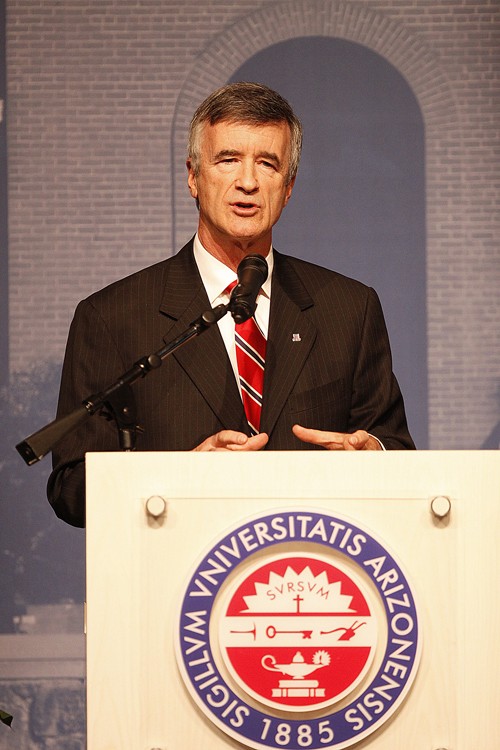In front of a crowd of 590 confirmed guests at the Grand Ballroom in the Student Union Memorial Center, UA President Robert Shelton spelled out the continuing mission of the university in simple terms at the 2009 State of the University address.
“”For those of you who are unclear on our purpose or confused about our mission, you need only write down these three words: access, quality and discovery,”” he said
Shelton spent the majority of his speech addressing these three key aspects of the university’s mission and how the campus community will move toward this goal despite nearly $100 million in state budget cuts over the last two years.
Shelton received a standing ovation upon the conclusion of his address, a speech several audience members felt captured both the positive and the negative.
“”He very much captured all of the challenges but more importantly the opportunities facing the university,”” said Associated Students of the University of Arizona President Chris Nagata.
“”He presented the actual figures, despite all the negative things he mentioned, it was very positive,”” said accounting junior Abel Serratos.
Shelton presented the financial hurdles facing the university. Hurdles that will not be easy to overcome, he said.
The university was forced to cut nearly a quarter of its state budget and faces further financial challenges in the years to come, Shelton said.
He emphasized that while the university will not falter in its mission, budget cuts made in the state legislature and the faltering national economy have required the university to make hard decisions and even harder cuts throughout the university.
“”We proceeded to lay out criteria that we hoped would allow us to maintain a quality student experience,”” Shelton said.
The criteria included protecting programs that had the capacity to attract investments from external sources and a focus on units that were central to meeting the state and the nation’s needs.
“”We knew, and I think most people would agree, that if we cut everything equally we were dooming the University of Arizona to a future of mediocrity,”” he said.
Shelton said the decision to focus on preserving the research capacity of certain units attracted negative attention from both the public and the media on a regular basis.
“”For those of you who have never experienced the unique pleasure of daily doses of venomous, often hyperbolic public criticism, let me assure you that it ranks right there with getting a root canal,”” he said.
However, perhaps more importantly, Shelton said the public criticism brought attention to the challenges the university faces and spurred heated debate that he hopes will inspire creative solutions to a dynamic problem.
“”Ultimately that’s what a university should be about,”” he said.
Despite cuts across the board, deeper in certain areas of the academic community than others, Shelton encouraged those in attendance to look towards the future with hope.
“”I would argue that as the state effectively forces us into a higher tuition, higher aid model, we should not despair,”” he said.
Despite substantial tuition increases, Shelton said student debt is on the decline due to the university’s priority of protecting financial aid. As a result, he added, the freshman class of 2013 is the largest, most ethnically diverse and best-qualified class in university history.
While the academic quality of students at the university is on the rise, the commitment to higher education on the part of the Arizona State Legislature and throughout the country is steadily declining.
“”In less than two decades we’ve seen higher education’s portion of the state budget pie in Arizona decline from more than 16 percent to 10 percent,”” said Shelton.
Shelton emphasized that while the rest of the world faces the economic crisis by bolstering their higher-education budgets, the United States continues to cut back on education spending, effectively reducing our ability to compete in an ever more technologically-based global market.
Despite a dwindling education budget, Shelton said the university will continue to nurture the creativity of its researchers. A group of individuals who have contributed to some of the decades most prominent scientific discoveries and already received $80 million in stimulus dollars.
“”The story this year at the University of Arizona isn’t about budget cuts, it is about exceptional people making a difference in the lives of students and the future of our state,”” said Shelton.
Shelton conceded that change will be inevitable at the university in the next few years. “”We will have to do things differently and more efficiently, and there are some things we will simply no longer be able to do,”” he said.
However, one thing that will not change, he added, is the commitment of the university to make life better for the state of Arizona.
“”We have been a part of the dream of Arizona families for 125 years,”” he said. “”Our task is to keep that dream alive. Working together, I am confident we can succeed.””









